Edition: 20 to 31 May 2024
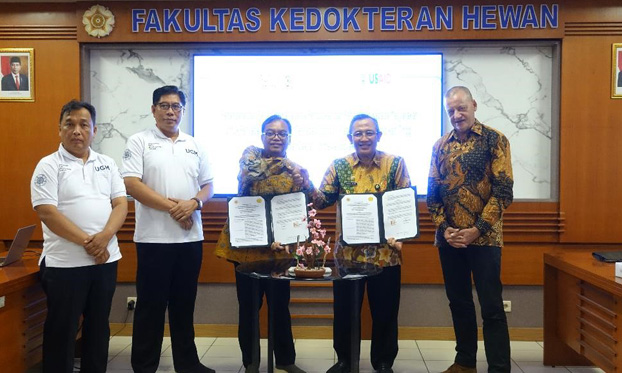 ©FAO/Saskia Soedarjo | INDONESIA Agreement to raise zoonoses awareness through education
Indonesia’s Ministry of Agriculture (MoA) and the Faculty of Veterinary Medicine at Gadjah Mada University (UGM) signed an agreement on 31 May 2024 to increase public awareness of zoonoses through education and community service programme. This two-year partnership, which is fully supported by FAO and the United States Agency for International Development (USAID), will leverage higher education institutions in Special Region of Yogyakarta. Read the news here. |
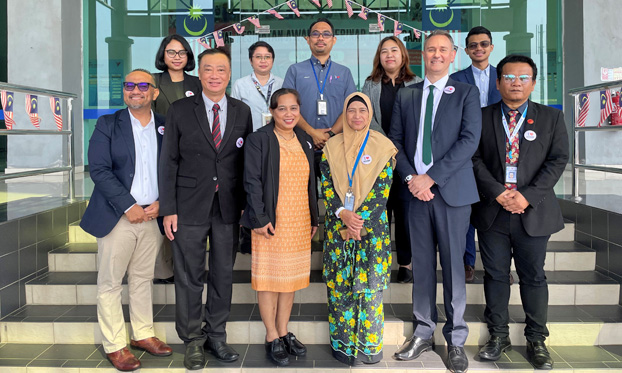 ©FAO/Maharti RIhana | ASIA AND THE PACIFIC Wrapping up the SMART-ASEAN project FAO, with funding support from the Australian Government through the Department of Foreign Affairs and Trade (DFAT), marked the end of the Strengthening Mechanism in Animal-health for a Resilient Association of Southeast Asian Nations (SMART-ASEAN) project in late May 2024. The event in Malaysia involved handing over equipment and documents to the ASEAN Coordinating Centre for Animal Health and Zoonoses (ACCAHZ) office and facilitated discussions between the Department of Veterinary Services Malaysia and the Department of Livestock Development Thailand, preparing for Thailand to host the next ACCAHZ. |
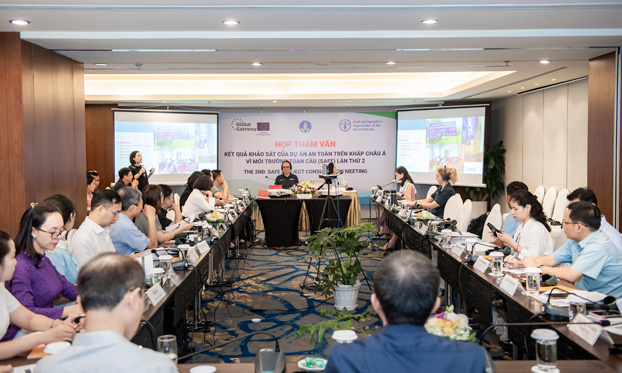 ©FAO Viet Nam | VIET NAM Raising concerns about the risk of zoonotic disease transmission from wild animals to humans and livestock In Hanoi, FAO and the Forest Protection Department of the Ministry of Agriculture and Rural Development (MARD) organized the second national consultation for the Safety across Asia for the global Environment (SAFE) project on 22 May 2024. The meeting reviewed field survey and legal review findings and discussed the ways forward to communicate these results to relevant stakeholders beyond government authorities. This meeting also provided an opportunity to update the SAFE project work plan, contributing to the Viet Nam One Health master plan. |
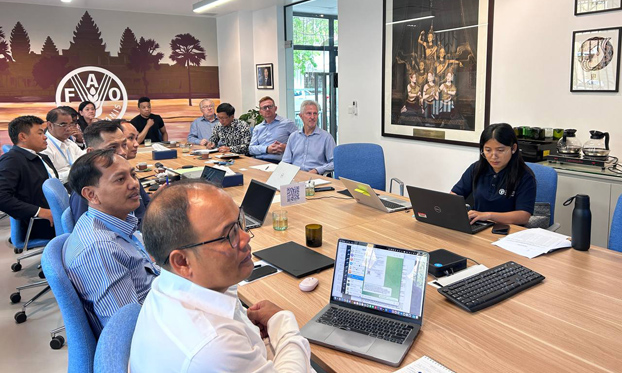 ©FAO/Samphors Pho | CAMBODIA Consultation meeting on environmental and animal health sectors
FAO met with the USAID Global Health Security team and other stakeholders on 29 May 2024 to explore the context and landscape for environmental and animal health sectors in Cambodia. The consultative included representatives from various organizations and academic institutions. |
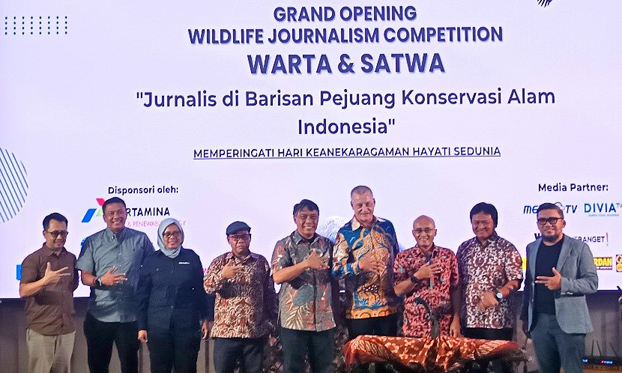 ©FAO/Satwika Movementi | INDONESIA Launch of wildlife journalism competition FAO and the Faculty of Communication Sciences at Padjajaran University launched the wildlife journalism competition in Bandung, West Java, on 22 May 2024. Supported by USAID, this initiative aims to increase public concern and government priorities on zoonoses in wildlife through wildlife conservation journalism capacity building. Roadshow seminars were also held in seven cities across Indonesia. Read the news here. |
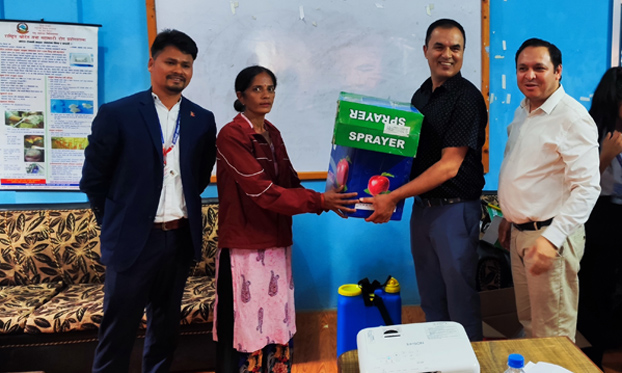 ©FAO/Surendra Karki | NEPAL Joint field mission by FAO and USAID FAO and USAID in Nepal conducted a field mission in eastern part of Nepal between 19 and 24 May 2024, participating in zoonotic disease and AMR orientation training sessions. Activities included farm biosecurity training and rational use of antimicrobials in Panchthar and sample collection and reporting training in Jhapa. |
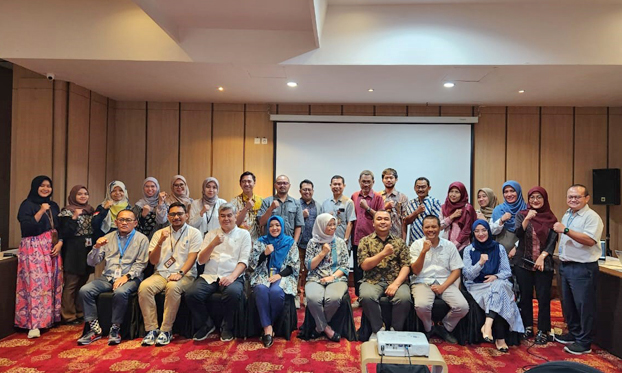 ©FAO/Andri Jatikusumah | INDONESIA Cross-sectoral coordination for zoonoses and emerging infectious diseases prevention FAO and Indonesia’s Coordinating Ministry of Human Development and Cultural Affairs (CMHDCA) held a cross-sectoral coordination meeting in Bogor from 29 to 31 May 2024. The meeting discussed follow-up mandates on CMHDCA Regulation No 7/2022 regarding zoonoses and emerging infectious disease (EIDs). With support from USAID, this meeting gathered representatives from various ministries and institutions to strengthen collaboration on zoonoses and EIDs threats using the One Health approach. |
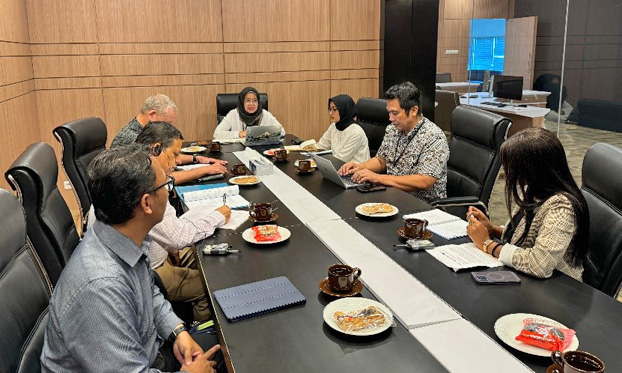 ©FAO/SGunawan Budi Utomo | ASIA AND THE PACIFIC AND INDONESIA Mid-term review of European Union-funded antimicrobial resistance project An independent mid-term review of the European Union (EU)-funded Regional Tripartite Antimicrobial Resistance (AMR) project in Indonesia was conducted from 27 to 29 May 2024. The review assessed progress made and cross-sector coordination on AMR initiatives led by CMHDCA, FAO and related stakeholders. |
Learn more about our work on partnerships here. | |
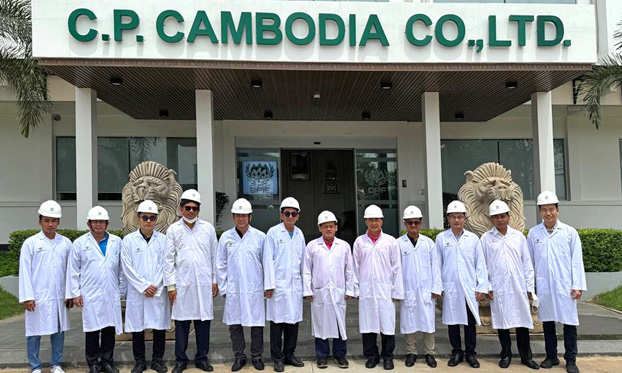 ©FAO/Siheng Ngon | CAMBODIA Visit to AMR best practices production house
FAO and Cambodia Livestock Association Raiser visited CP Cambodia Co. Ltd from 28 to 29 May 2024 to observe best practices in addressing AMR and antimicrobial use (AMU) in animal feed. This visit demonstrated the company’s efforts in promoting prudent AMU and disease prevention, from animal feed production, pig and poultry farms and slaughterhouses to laboratories. This collaboration promotes private sector engagement that contributes to safe animal food, sustainable production and One Health. |
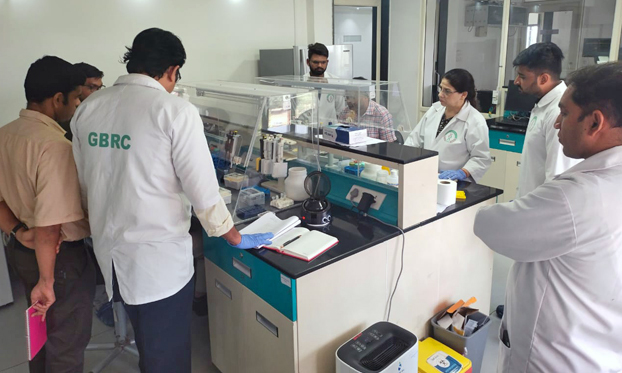 ©FAO/Rajesh Dubey | INDIA Genomic surveillance training for AMR
FAO and Gujarat Biotechnology Research Centre conducted a five-day training program on genomic surveillance for AMR in Gandhinagar, Gujarat from 27 to 31 May 2024. The training empowered participants to generate actionable insights from genomic data for evidence-based decision-making in AMR management. Genomic surveillance is a pivotal tool in modern biology and medicine, enabling the understanding of the genetic basis of diseases and supporting informed public health interventions. Its application in tracking the emergence and spread of antibiotic-resistant bacteria is crucial in combating AMR. |
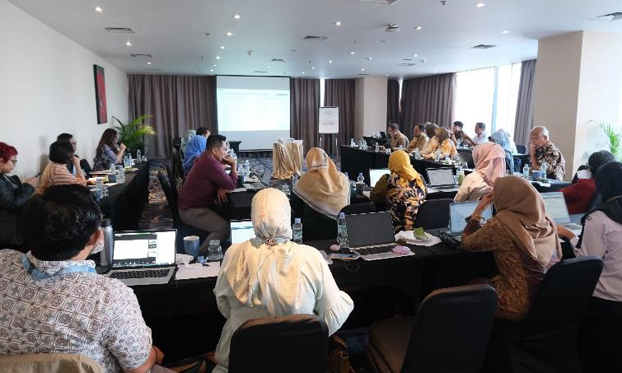 ©FAO/Alia Dwirahmani | INDONESIA AMR advocacy working group
FAO and CMHDCA held a cross-sectoral coordination meeting in Jakarta on 28 May 2024 to discuss action plans on AMR. The event, supported by the EU, involved multiple ministries and agencies. |
Learn more about our work on AMR here.
| |
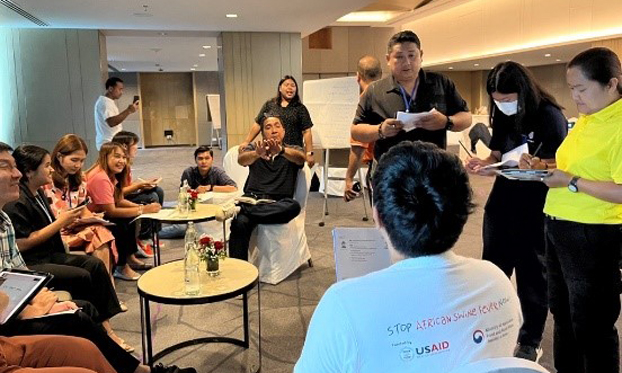 ©FAO/Ryungmin Hwang | ASIA AND THE PACIFIC AND THAILAND African swine fever outbreak simulation exercise
Three national simulation exercises on African swine fever (ASF) outbreak investigation took place in Thailand from April to May 2024. FAO and Thailand’s Department of Livestock Development (DLD), utilizing existing materials from the regional simulation exercise the previous year, developed and adapted scenarios to fit the national context. 145 participants from 21 provinces attended the workshops. The events were financially supported by the Defense Threat Reduction Agency (DTRA) of the United States. |
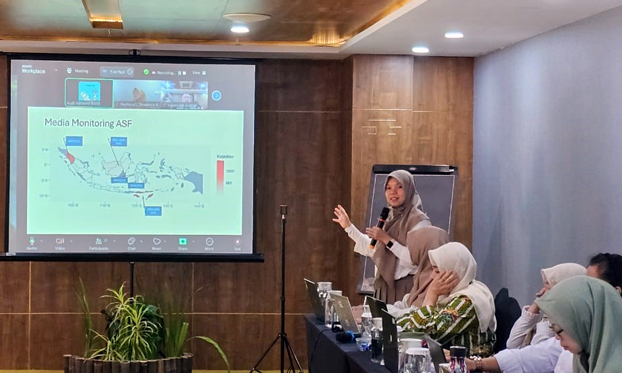 ©FAO/Ali Arasyi | INDONESIA ASF monitoring coordination meeting FAO and MoA convened a technical coordination meeting in Yogyakarta on 22 May 2024, emphasizing ASF monitoring and biosecurity measures. FAO provided updates on the global ASF situation, highlighting several pressing concerns, particularly the indication of circulating illegal vaccines. Key points from the meeting included updates from World Organisation for Animal Health (WOAH) and experts continuing to strongly advocate for biosecurity measures as the primary countermeasure against ASF, rather than relying on vaccines. |
Learn more about our work on ASF here.
| |
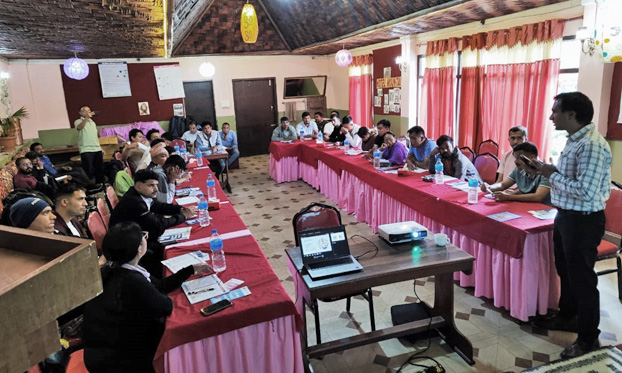 ©FAO/Surendra Karki | NEPAL Training on prioritized zoonotic diseases and AMR FAO, through USAID funding, conducted an orientation training on prioritized zoonotic diseases and AMR in on 21 May 2024. The training sought to align animal and public health professionals from various local levels on prioritized zoonotic diseases and AMR. In total 24 animal health professionals and 5 human health professionals participated and discussed key zoonotic diseases such as avian influenza, rabies, brucellosis, tuberculosis and leptospirosis as well as AMR. This programme was conducted in collaboration with the Department of Livestock Services and the Veterinary Hospital and Livestock Services Expert Center.
|
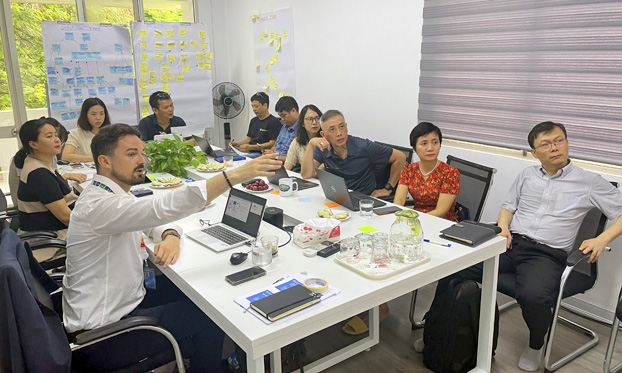 ©FAO/Pawin Padungtod | ASIA AND THE PACIFIC AND VIET NAM Programme results framework workshop FAO conducted a workshop in Viet Nam from 29 to 30 May 2024 to develop the FAO ECTAD programme results framework using the theory of change (TOC). MARD, agencies and partners reviewed and provided feedback on the TOC, ensuring it aligned with national priorities. This collaborative effort helps define how the FAO ECTAD in Viet Nam contributes to reducing pandemic risk while preserving livelihoods in alignment with resource partners and national priorities.
|
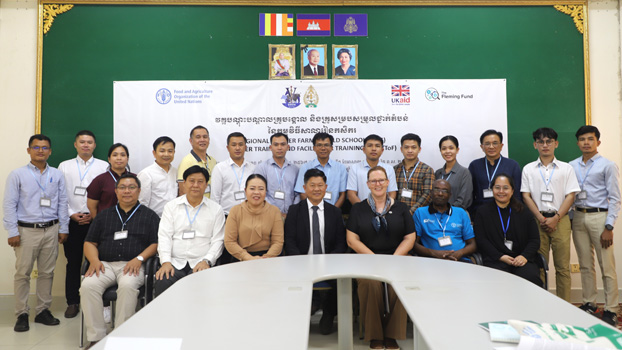 ©FAO/Siheng Ngon | CAMBODIA Regional Broiler Farmer Field School training kicks off FAO and the Faculty of Veterinary Medicine at Royal University of Agriculture began a series of master trainer and facilitator trainings for Broiler Farmer Field School (BFFS) on 20 May 2024. With financial support from the Fleming Fund, these trainings aim at building capacity for BFFS rollout in Asia, increasing awareness, enabling good practices, promoting responsible use of antimicrobials and addressing AMR and AMU at farm level.
|
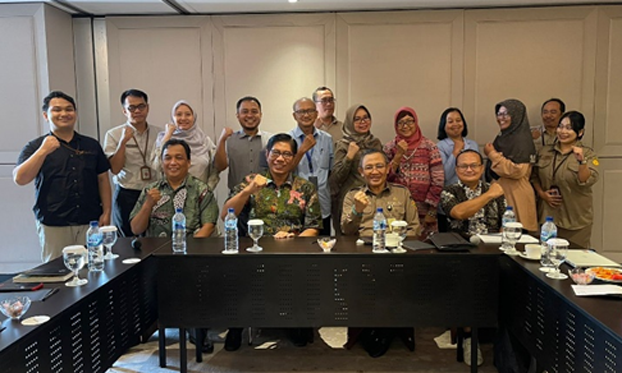 ©FAO/Ahmad Gozali | INDONESIA Independent learning curriculum meeting for zoonoses awareness FAO and MoA held an initial meeting between 21 and 22 May 2024 to discuss the strategy for teacher training and implementation of the independent learning curriculum on zoonoses awareness in schools. The programme involved college students from the Faculty of Veterinary Medicine at UGM as well as students and teachers from preliminary schools in Sleman and Gunung Kidul districts.
|
Learn more about our work on capacity development here.
| |
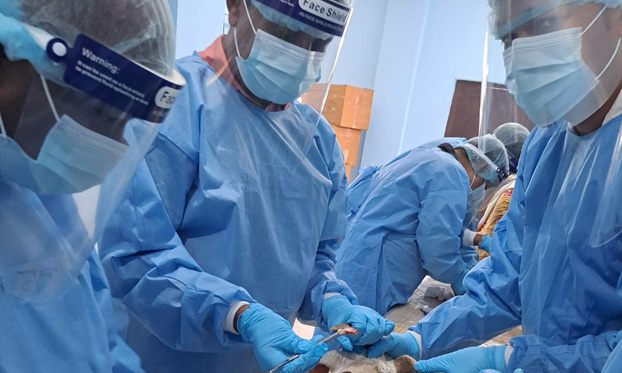 ©FAO/Sharmila Chapagain Kafle | NEPAL Collection, dispatch and epidemiological reporting training Through USAID funding, FAO conducted training on sample collection, dispatch and epidemiological reporting in Jhapa from 23 to 24 May 2024. The training aimed to equip animal health professionals working at different local levels with hands-on skills in appropriate sample collection, accurate packaging and timely dispatch of samples for prompt disease diagnosis. The training was organized in collaboration with the Department of Livestock Services and Veterinary Hospital and Livestock Service Expert Center in Jhapa. |
Learn more about our work on epidemiology here.
| |
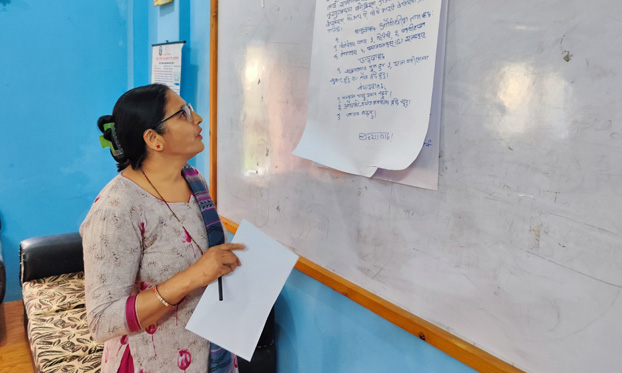 ©FAO/Surendra Karki | NEPAL Farmers training on biosecurity measures and antimicrobial use With funding from USAID, FAO conducted training on biosecurity measures and rational antimicrobials use for small and medium-holder poultry farmers in Phidim, Panchthar from 21 to 22 May. The training, attended by 24 farmers from different municipalities, focused on good husbandry practices, biosecurity implementation on farms to reduce disease incidence and the rational use of antimicrobials in farm animals. The training was conducted in collaboration with the Department of Livestock Services and Veterinary Hospital and Livestock Service Expert Centre in Panchthar. |
Learn more about our work on risk reduction along the value chain here.
| |
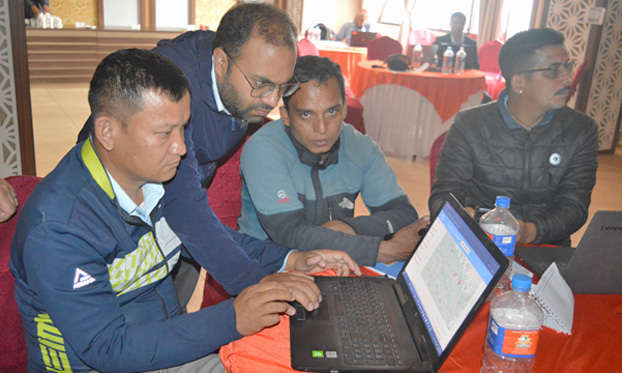 ©FAO/Sujan Shrestha | NEPAL National Animal Health Information System orientation for epidemiological reporting FAO, through USAID funding, conducted two sessions of the orientation training on National Animal Health Information System (NAHIS) for epidemiological reporting for animal health officials from Ramechhap, Sindhuli, Kavrepalanchowk and Dolakha districts. The training, held from 21 to 22 May 2024, aimed to guide officials to use the web-based NAHIS software for immediate reporting of notifiable diseases and regular reporting for other disease conditions. A total of 48 officials were trained with technical support from Department of Livestock Services.
|
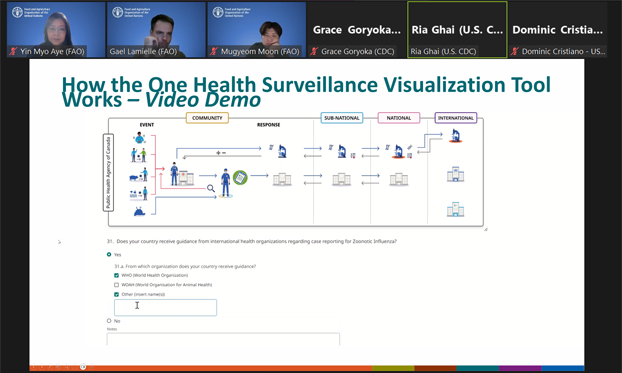 ©FAO/Yin Myo Aye | ASIA AND THE PACIFIC Introduction of One Health Surveillance Visualization Tool The United States Centers for Disease Control and Prevention (US CDC) One Health Office introduced FAO to the One Health Surveillance Visualization Tool (One Health-SurViz) on 30 May 2024. It is an interactive, web-based tool that assists countries in improving their capacity to conduct coordinated, multisectoral surveillance across One Health sectors, aligning with the guidance outlined by the Tripartite Zoonoses Guide. This tool leverages best practices for coordinated surveillance and information sharing and is an innovative resource for countries to advance One Health and improve zoonotic disease prevention and control.
|
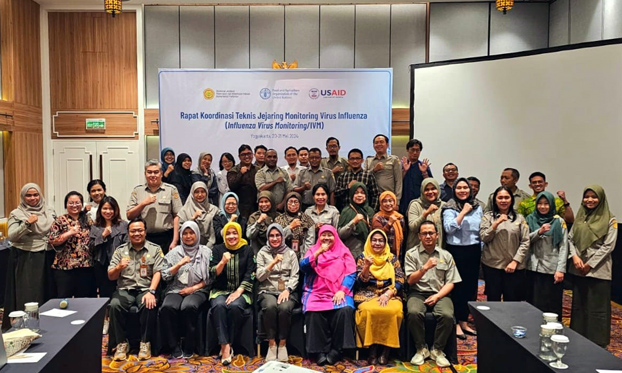 ©FAO/Dian Tarigan | INDONESIA Influenza Virus Monitoring coordination FAO and MoA, through support from USAID, held a technical coordination meeting in Yogyakarta from 20 to 21 May 2024 to discuss the current situation on global and national on influenza virus circulation, including new highly pathogenic avian influenza (HPAI) H5N1 clade 2.3.4.4b with Influenza Virus Monitoring (IVM) team members from Disease Investigation Centers, National Veterinary Drug Assay Laboratory, Veterinary Pharmaceutical Center, universities and the private sector.
|
| Learn more about our work on surveillance here. | |
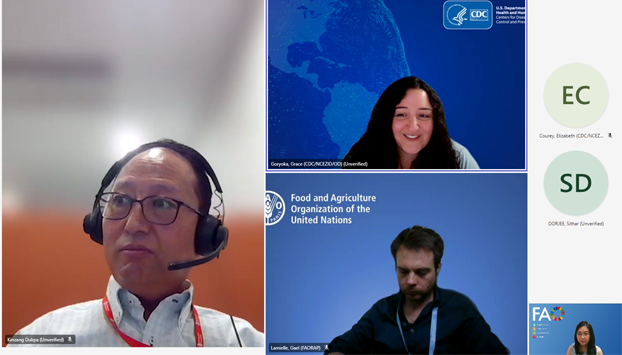 ©FAO/Yin Myo Aye | ASIA AND THE PACIFIC AND BHUTAN Debriefing on One Health Zoonotic Disease Prioritization On 23 May 2024, FAO, World Health Organization (WHO) and WOAH had a virtual debriefing meeting with US CDC One Health Office following a One Health Zoonotic Disease Prioritization (OHZDP) workshop in Bhutan. The OHZDP workshop was led by FAO and was the first Tripartite facilitation on OHZDP.
|
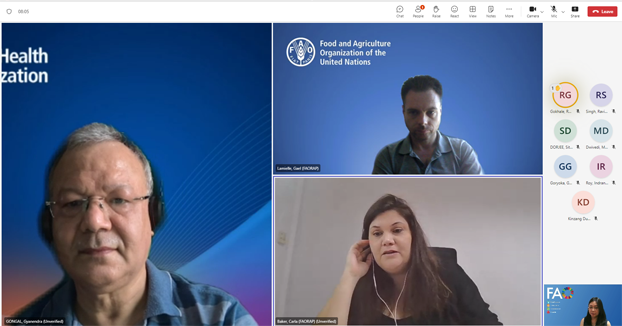 ©FAO/Yin Myo Aye | ASIA AND THE PACIFIC AND SRI LANKA Planning meeting for OHZDP workshop FAO, WHO, WOAH and US CDC discussed the upcoming OHZDP workshop in Sri Lanka. The workshop is tentatively scheduled in Sri Lanka during August 2024, using US CDC’s OHZDP standardized method. Preparation will proceed among US CDC, Tripartite regional and country offices and the national planning team through regular virtual meetings.
|
-training-organized.png?sfvrsn=c54364b3_1) ©FAO/Yin Myo Aye | ASIA AND THE PACIFIC AD MALAYSIA Online joint risk assessment (JRA) training organized FAO, WHO and WOAH provided online training for Malaysian facilitators on the Tripartite Joint Risk Assessment Operational Tool (JRA OT) on 30 May 2024. The training supports local capacity building to facilitate the JRA workshop on rabies in June 2024. A total of 16 representatives from animal health, human health and wildlife sectors from the national and sub-national levels participated in the training interactively.
|
| Learn more about our work on One Health here. | |
